Three Summer Reads — That Aren’t Your Usual Cookbooks
“TomatoLand”
If you’ve ever eaten a tomato, “Tomatoland” (Andrews McMeel), is an absolute must-read.
What Eric Schlosser’s book, “Fast Food Nation” (Harper Perennial), did to unveil the dark side of the cheap, drive-through burgers Americans can’t get enough of, James Beard Award-winning writer Barry Estabrook does the same to modern industrial agribusiness that has reaped the profits from creating tomatoes that are tasteless, less nutritious, 14 times higher in sodium, and inexplicably available year-round in supermarkets nationwide.
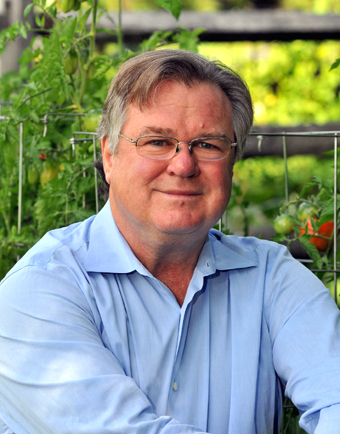 You’ll learn that Florida may grow one-third of all tomatoes in the United States, yet its climate is highly unsuitable for that crop. Its sandy soil possesses little nutrients, requiring the need for chemical fertilizers. Its humid, torrid temperatures foster fungal diseases and insects, necessitating hundreds of herbicides and pesticides. And the largely Hispanic migrants who pick the tomatoes work in dangerous conditions, and in some cases, treated little better than modern-day slaves.
You’ll learn that Florida may grow one-third of all tomatoes in the United States, yet its climate is highly unsuitable for that crop. Its sandy soil possesses little nutrients, requiring the need for chemical fertilizers. Its humid, torrid temperatures foster fungal diseases and insects, necessitating hundreds of herbicides and pesticides. And the largely Hispanic migrants who pick the tomatoes work in dangerous conditions, and in some cases, treated little better than modern-day slaves.
Estabrook first popped the lid on the horrendous conditions some tomato pickers face in an investigative piece he wrote two years ago when he was a former contributing editor to Gourmet magazine.
This book will shock you and anger you. It also will leave you a wiser, choosier consumer more aware of the very real economic, social, and environmental consequences your everyday purchases can have.
Meet Estabrook at a free event, 6 p.m.-7 p.m. Aug. 16 at Omnivore Books in San Francisco.
“Lobsters Scream When You Boil Them”
Among the most prolific cookbook writers around, Bruce Weinstein and Mark Scarbrough, are at it again. While their latest book does have 25 recipes, it’s not a standard cookbook per se.
Instead, “Lobsters Scream When You Boil Them” (Gallery Books) is more a reference-style book, albeit one that Laurel and Hardy might have written.
The duo, whom I’m proud to call friends, debunks 100 culinary myths, many of which we’ve come to think of mistakenly as truisms.
Are foods prepared at home safer than food prepared in a restaurant? Uh, not quite, according to Weinstein and Scarbrough. In fact, more people get sick from food at home than from meals at restaurants.
At high altitudes, should you increase the stated oven temperature by 25 degrees? Nope. Temperatures are not affected by altitude, say Weinstein and Scarbrough. But at higher elevations, everything in the oven dries out faster. If you were to raise the temperature of the oven, you’d be worsening the problem. Instead, add more moisture to recipes for baking and roasting, and make adjustments in the leavening amount for baked goods.
Does alcohol destroy brain cells? Nyet. “If it were true, almost every novelist would have quit producing work in their early thirties. Faulkner? Nothing after ‘The Sound and the Fury.’ Fitzgerald? Nothing after ‘The Great Gatsby.’ Tennessee Williams? Nothing ever,” they write, amusingly.
You’ll be in stitches as you soak up the knowledge they impart.
“Plate to Pixel”
If you’re a newbie food blogger or love taking photos of what you eat to show off to friends, “Plate to Pixel” (Wiley) will be an invaluable tool.
Helene Dujardin, a former professional pastry chef-turned-photographer and stylist, is the creator of the lovely blog, Tartelette. The casual, inviting and utterly luminous look of her photos have inspired countless food bloggers to aspire to creating their own images in that vein.
In this book, Dujardin teaches the basics of how to get the most out of your camera, how to work with umbrella diffusers and reflectors, and how to style and coordinate props for your food dishes. And she does all that in a thoroughly accessible and understandable way.
For a more extensive review of this book, please go to ProjectFoodie.com.
Recipes to Try From Bruce Weinstein and Mark Scarbrough: Baked Spinach-And-Goat Cheese Dumplings
And: Shirred Eggs in Prosciutto Crudo Cups
And: Maple Blondies with Butterscotch and Cocoa Nibs
And: Thyme Roasted Shrimp

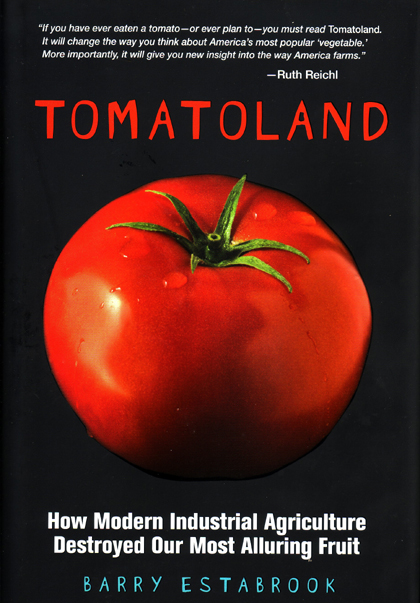

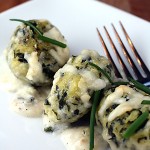
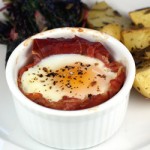
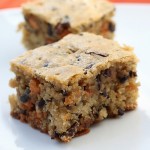
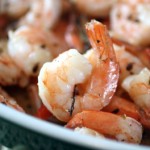
I’d love to read Hélène Dujardin’s book. It looks and sounds so promising.
Cheers,
Rosa
good choices! i heard about the lobster one on NPR yesterday. it was sad about the lobsters
Oooh the photography book looks promising.
I’m quite interested in the first two books – one about ingredients and another about myths of food/cooking. Thanks for these recommendations
Those books sure look like great reads! Thanks so much for your reviews!
Great range of books Carolyn! There’s something for every foodie here!
All three look really interesting, Carolyn. Love humor in the kitchen…putting that on my wish list right away.
I’ve had From Plate to Pixel sitting on my nightstand for forever and I’ve been reading it, slowly but surely. I’ve also been dying to read Tomatoland! Great reviews!
these are great to know about -thanks for letting us know!
I have Plate to Pixel already but I’ll put the other two on my wish list!
Great revues and they all sound like wonderful reads. I have really wanted to get a copy of Tomatoland, an I think I will just do that
Timely to see tomatoes on the blog I have been experimenting a bit with tomatoes and just cooked tomatoes as a vegetable and then as a fruit – was pretty interesting. Anyhow, it is sad that a lot of fruits and vegetables available in supermarkets look pretty but have nowhere near the flavor or taste…
I have been experimenting a bit with tomatoes and just cooked tomatoes as a vegetable and then as a fruit – was pretty interesting. Anyhow, it is sad that a lot of fruits and vegetables available in supermarkets look pretty but have nowhere near the flavor or taste…
All books sound like very interesting reads. I’m almost afraid to read Tomatoland though. I absolutely love tomatoes and grow as many as I can in my small space. The ones I buy are from trusted sources most of the time. I know I shouldn’t buy tomatoes when they are out of season, but I sometimes do. I fear if I read the book, I won’t anymore. And that would probably be a good thing…